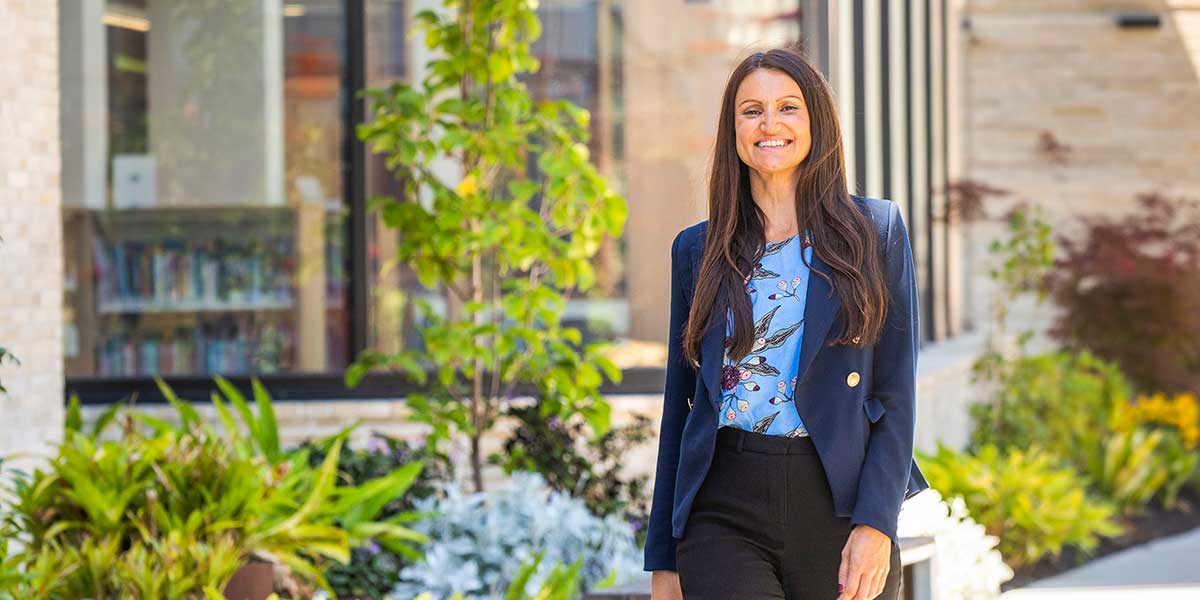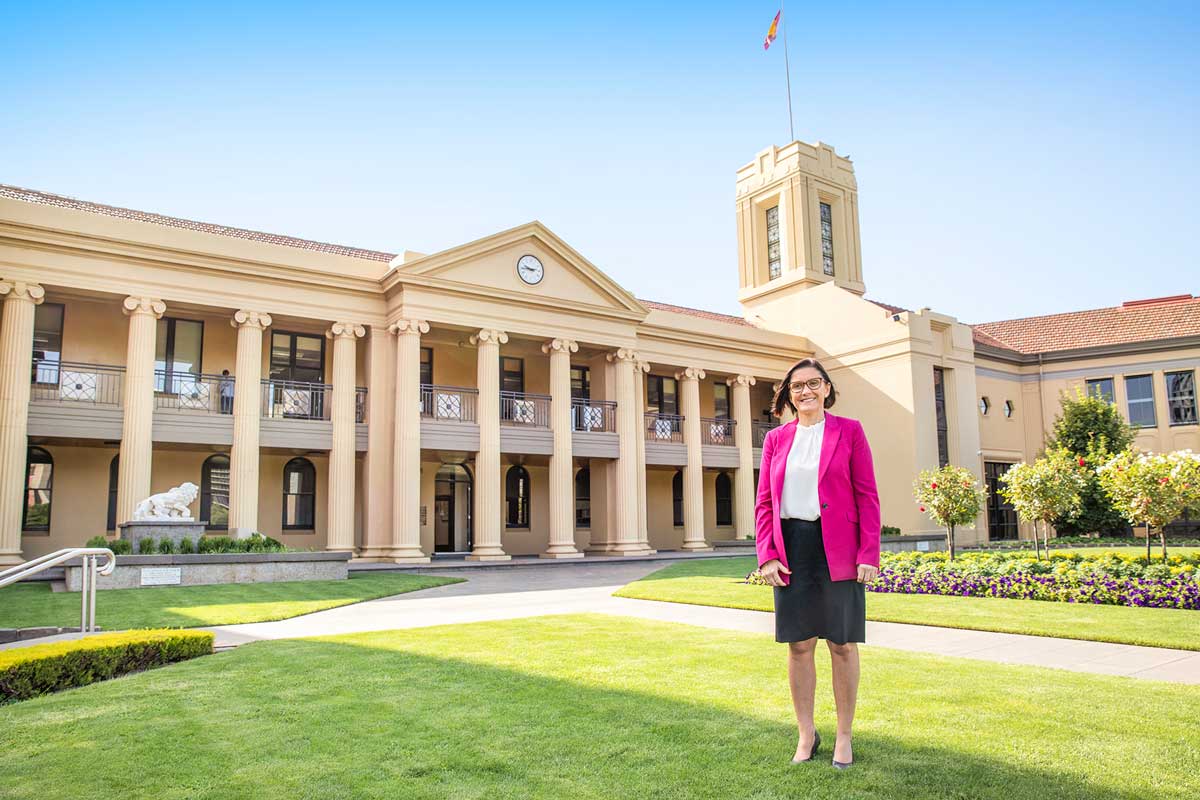
This International Women's Day, we put the spotlight on two of our inspiring female leaders, our Heads of the Glen Waverley and St Kilda Road Campuses. Year 12 students Josie Gregory-Walker and Olivia Khouw got the inside scoop for their student magazine, and an edited extract is below.
What are your main responsibilities as Head of Campus?
Sheriden Vella, Head of Glen Waverley Campus (Ms Vella): As Head of Campus, there is a need to have an oversight of the day to day operations, and to work with the Heads of School, curriculum leaders and pastoral staff on a regular basis. However, there is also a need to think big and consider the strategic direction of the Campus and in fact, the College.
There is much that I focus on that relates to the now, ensuring that our culture is a positive and inclusive one, that our students are given the best opportunities to grow and thrive in the classroom and out, and that our staff are seeking continuous improvement in their practices, yet having an eye on the future is also crucial. It is with the College Executive team that this direction is discussed and established and being a part of that group is imperative for me as a Head of Campus. Very little is done in isolation and being part of the College Executive team assists me to then empower my Campus Executive team and so on.
Kim Bence, Head of St Kilda Road Campus (Ms Bence): Aside from leading and managing the direction for teaching and learning, overseeing the wellbeing of our students and staff and ensuring operationally that the ‘trains run on time’, I firmly believe my primary responsibility as Head of Campus here at SKR is to develop people. I have always believed that positive relationships based on honesty, trust and respect lie at the very heart of high performing schools and great leaders model these values and behaviours every day.
In my role, I am responsible every day for providing a positively engaging learning culture that challenges every individual (wherever they are at), to be the very best that they can be. Schools are not simply responsible for developing lifelong learners; schools are responsible for developing good human beings. In my role, I see these two important responsibilities as inextricably linked.
What inspired you to pursue a career in leadership?
Ms Vella: Leadership was not something I initially aspired to in my teaching career. There is not one moment where I suddenly had an epiphany and decided to become a leader. It was gradual. I worked hard in a job that I enjoyed immensely. I made a point of learning all I could about the profession I had chosen for myself. I made it a goal to upskill, saying a resounding yes to any opportunity that came my way. Nowadays, many young people wait for the supposedly perfect moment to jumpstart their careers, but I believe that one should instead take every opportunity that is available to them.
I connected, I collaborated but most importantly, I cared. Crucially though, I had leaders around me who noticed, and those leaders were focused on growing those around them and succession planning for the future. It’s because of those leaders that I was able to develop my skills in leadership.
Ms Bence: From my earliest years, I have always been inspired by leaders, whether they be my parents, some of my teachers, coaches, colleagues, sporting heroes or global figures. As a young person I was heavily involved in competitive sport. Over my junior years, I was exposed to many strong, passionate and committed leaders across multiple sports. I was privileged to observe and learn from them over many years and I was always inspired by their capacity to lift individuals, unite teams and communities to excel and achieve. I was fortunate to have some wonderful role models as a young person and many opportunities to captain junior teams into early adulthood as well as hold student leadership positions throughout my school years. I never really saw myself as a leader as a young person, I think we just learn on the job through opportunities when they present.
Who has been your biggest role model or mentor in your career?
Ms Vella: Many years ago, I worked with a woman named Judy Hewett. She was initially appointed Head of Middle Years at a time when I was a young teacher. Judy went on to further leadership roles, including Head of Pastoral Care for Years 7-12, and Head of Senior Years. It was an important time for the school to appoint such an influential female leader, as they moved from an all-boys to coeducational school. Watching Judy navigate her leadership journey in a male-dominated school was truly inspiring. More than that, she actively looked to help me grow as a leader, by mentoring me across several years. She was never someone who wanted to squash other women out of fear, but instead supported everyone. I will forever be grateful to Judy for her role modelling as well as her generosity in helping me develop as a leader.
Ms Bence: I could not single out one person as the biggest role model or mentor in my career. I have been very blessed throughout my career to have been exposed to many wonderful, strong and passionate leaders across many different schools and contexts. I have learnt and grown in so many ways from every single one of them. I have also learnt what not to do as a leader on some occasions. I attribute my leadership strengths and style to all of them who have in many ways challenged, stretched and molded me into the leader I am today. I continue to seek their guidance and support as I continue to grow and develop in my role. I don’t believe we ever stop developing as leaders. It is a lifelong journey of exploration, self-reflection and growth.

What is your opinion on female leadership and representation, especially in male-dominated fields?
Ms Vella: Without doubt there are industries or career paths that are far more challenging for women to aspire to leadership roles. Things have certainly improved for women, but attitudes in society still have a long way to go. Merit-based appointments to leadership roles are the key for me. In my mind, gender should be irrelevant, and the focus should be the skills and attributes of the candidates measured against the selection criteria. I do acknowledge that women do not always build up the necessary skills needed for these roles due to a lack of encouragement, support, and ultimately professional development opportunities. It’s there that industries need to change the most. Intentionally upskilling women and providing opportunities to grow, having women role modelling successful leadership and celebrating their achievements is paramount. Education in schools must also play a significant part. It’s everyone’s responsibility to champion equality, men and women, boys and girls. It’s also in everyone’s best interest to live in a gender-equal world. When I see women tearing down other women, it really upsets me. And it’s not about men against women, but rather the notion of ‘if you don’t have anything nice to say, don’t say anything at all’.
Ms Bence: We have a lot of work to do. Humanity has a lot of work to do in this space. I think we have certainly come a long way. I think the focus on female leadership and representation has come a long way but there is certainly plenty of work still to do. Gender diversity invokes a multitude of perspectives, so it is most important that it is represented at the ‘table’. Initiatives like International Women’s Day are fantastic, but it centralises the focus on one day a year. Why are we celebrating it one day a year and not the other 364? Why don’t we celebrate International Men’s Day? In fact, it’s not about the rise of women and the fall of men. It’s about basic human rights. Is it an equal playing field in 2021? No, not at all. There’s still a lot of work to do.
How do you envision the future of the movement for female equality?
Ms Vella: I hope a time comes when we no longer need an International Women’s Day. I feel that is quite the way off, so in the meantime women need to continue to champion each other and raise awareness for women’s issues and rights. And this is not just in countries like ours, but in developing and third world nations where women continue to be oppressed, marginalised and victimised. In these cases, we can afford to overlook and disregard certain issues, just because we aren’t personally affected by them. However, the only way to further collective gender equality is for us to be the voices for those who cannot speak up on their own.
Ms Bence: We need to keep working hard to support and encourage one another as we move forward. Too often we can be our own worst enemies. We need to be focusing on building capacity in one another, celebrating the achievements and recognising the strengths and incredible skillsets. I think we need to celebrate the achievements of women and sell those stories. The world needs to hear those stories, particularly women thriving in male-dominated fields. We need to continue to work hard to raise awareness around bias in workplaces and organisations. I think the next step is taking action against inequality. Education has an important role to play. It is the single greatest weapon we have to effect change in this world. Educating the next generation on the importance of gender equality will provide for an excellent starting point to instigate generational change.
What advice would you give to young women who aspire to achieve success?
Ms Vella: Educate yourself. Surround yourself with people to whom you aspire. Seek out role models and ask them to mentor you (male or female). Don’t be afraid to apply for a leadership role. Back yourself. Don’t take ‘no’ as the end of the road. Pave a new road. Look after yourself, take time out for things that you love, things that nourish your spirit and don’t be so hard on yourself. Support other women, never tear them down. Most importantly be a lifelong learner, and as you travel your path take people along for the journey and help them to be the best version of themselves.
Ms Bence: Be authentic, be honest, loyal and true to your values.
Be courageous. Embrace opportunity, take risks. Never be afraid of vulnerability, view mistakes as opportunities for growth, invest in your passions and interests, seek to identify and cultivate your strengths and work hard every day to be the very best version of yourself.
When all else fails……Be you. Believe in you. Live Life.
Tomorrow is the first day of the rest of your life. Use tomorrow to create your own success.
Olivia Khouw and Josie Gregory-Walker are the Year 12 Publications Prefects at the Glen Waverley and St Kilda Road Campuses, respectively.
